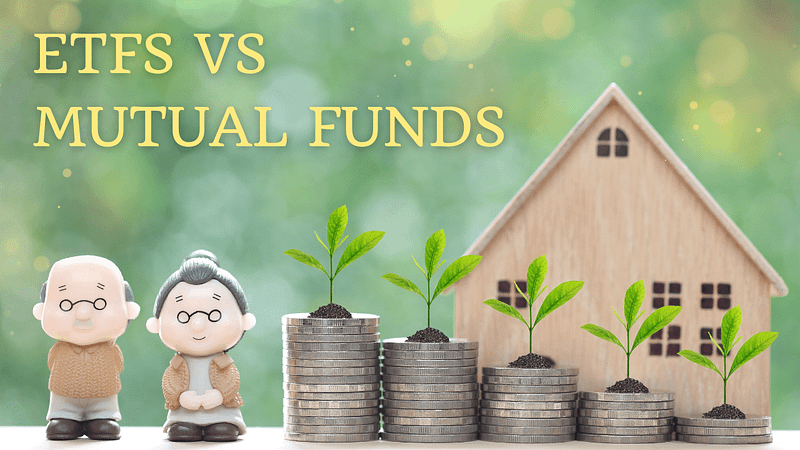
ETFs and Mutual Funds: A Beginner's Guide to Your Investment Options
ETFs and Mutual Funds which is best option for beginner investment? Find out, you’re one of the trusted platform to know in detail comparison of both.
Making the right investment choice is the most crucial step in achieving long-term financial goals. The most safest and popular options are exchange-traded funds( ETFs) and mutual funds. Both investment options allow investor to access diversified portfolios. This article helps beginner to understand key difference in both investment options.
Understanding the Basics
What Are Exchange-Traded Funds (ETFs)?
A ETFs or exchange-traded fund, a bunch of investment fund that trades on major stock exchanges much like bunches of stocks.Most of the ETF’s are designed to track the performance of specific commodity (Silver , Gold etc), Sector ( Industrial , Agriculture, Defence etc) or index ( NIFTY , BANKNIFTY etc). Buy and Selling can be done throughout the day in market hours. It offers both liquidity and market agility
What Are Mutual Funds?
A mutual fund is a investment fund which is combination of different varieties of stock , bonds and securities. It was a duty of fund manager to maintain this investment. Unlike ETFs , mutual fund share can buy and sell once per day and after the market hour closed the fund is allocated on the basis of fund’s Net Asset Value ( NAV).It usually preferred for long term investment.
Difference Between Mutual Funds and Exchange Traded Funds
Pricing and Valuation
ETFs usually subject to market pricing throughout the trading hours.The investor can react to market easily and buy and sell ETF on basis of demand. NAV value is keep on changing. However in Mutual funds are rigid and always credited to your account after markets close. It offer more stability to the investor.
Cost Comparison
The Major difference between ETFs and Mutual funds is cost comparison. Mutual fund is generally operates by fund manager so often comes with high expense ratio for research and maintain portfolio of funds. There exist load fees is more which impact your overall return and On the other hand ETF require less expense to investing. There brokerage commission is also low and some organisation provide free brokerage too.
Suitability of funds
- ETFs : Exchange Traded funds is usually opted by those investor whose major goal is short term capital. Day trader usually do entry and exit market in a single day and do profit booking.
- Mutual funds : Mutual funds is long term investment plan, it usually for long term trader, which has a desired oriented goal for future , like saving plan , retirement plan, Children education purpose. Holding period for better return will be 5-15 years.
Risk Management and Performance
ETFs usually perform better in short term period compared to mutual funds, as MF required long time to outperform in niche. Similarly the risk is more in ETFs due to high volatility in the market but mutual will remain safe as investment is for long term basis.
Which Is Right for You?
Consider Your Investment Goals
- Long-Term Growth:
If you’re aiming for long-term growth, mutual funds might be a better choice due to professional management. - Flexibility and Control: If you want more control over your investments and the ability to trade during market hours, ETFs could be more suitable.
Evaluate Costs
- Budget-Friendly: If keeping costs low is a priority, ETFs generally have lower fees compare to mutual funds.
- Willing to Charges for Expertise: If you value professional management and are willing to pay higher fees, consider mutual funds.
Best Apps To Purchase ETFs and Mutual Funds
There are multiple Online Apps and Website which offer day to day trading and investment option in mutual funds, etfs, stock market and many more. Disclaimer : There is no promotion for below listed mentioned website, do your own research before investing.
Apart from this apps, there are multiple banks like HDFC, ICICI Banks and Kotak Mahinder and many more offer such facility.
Conclusion
There is complete winner in the debate of exchange-traded funds and mutual fund options which is better. Each has has there own advantages that cater to different investor profiles. ETFs offer tax efficiency, lower costs, and real-time trading—ideal for hands-on investors and for those who need short-term investment and better finance. Mutual funds provide active management, long-term investment focus.
Is ETFs a good investment?
Yes , ETFs can be a good investment option for short duration and better returns. But will be advisable to do your own market research and investment according to your financial goals
Do ETFs have fees?
Yes ETFs have a limited/Lower fees compare to any other investment, you may check expense ratio before investing.
Is mutual fund better than FD?
Yes Mutual Fund has some benefits over Fixed Deposit like the rate of return is more if market perform well. Fixed deposit is safe compare to Mutual fund.
